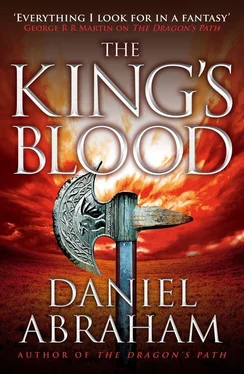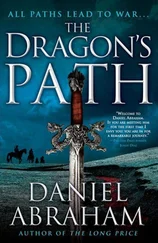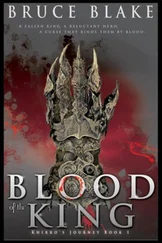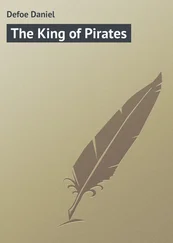“You’re back,” she said.
“Yes, ma’am,” Marcus said.
“She’s still sleeping.”
“Sorry?”
“I saw you looking around for the girl. She’s not here. She’s still sleeping. What happened?”
Marcus put the sword on the desk. Pyk looked down at it, then up at him, scowling.
“He was where we thought, and he knew we were looking for him. When I talked to him, he tried to cut me down.”
“And?”
“He didn’t manage.”
Pyk nodded curtly.
“You’ve handed him to the magistrates?” she asked.
“Saw him in the box before we came back.”
Pyk sucked at her teeth, plucked the pen from its inkwell, and wrote a line in the margin of the original contract. For a woman with such huge hands, her writing was tiny and precise. Putting the pen back in place, she sighed prodigiously.
“I need you to fire half your guards,” Pyk said. “Whichever ones you like. Use your best judgment.”
Marcus laughed before he saw she wasn’t smiling. Yardem coughed. Pyk scratched her arm, looking up at him from under her eyebrows.
“We can’t do that,” Marcus said. “We need the men we’ve got.”
“All right,” Pyk said. “Then cut their pay in half. Doesn’t matter to me. But I have reports to send back to the holding company, and we need our expenses down. If we see fewer cock-ups like this”—she gestured at Canin Mise’s blade—“we can hire some back in the autumn.”
“Ma’am, all respect, but the guards will need to eat before autumn. I try to bring them back, they’ll have other work. I’ve run a company. It costs less to pay a few men you don’t need than to need a few you haven’t got.”
“You haven’t run a bank,” Pyk said. “I’ll want the names of the ones you’re losing by tonight. Can you handle that, or do you need help?”
Marcus leaned forward, his hand resting on the pommel of his sword. He was tired and hungry and the anger that boiled up in him felt liberating. Like anything that felt good, he distrusted it. He looked over at Yardem, and the Tralgu’s face was perfectly bland. Pyk might have asked him whether it was raining outside.
“I can handle it,” Marcus said.
“Then do.”
He nodded, turned, and stepped back out into the street. In the east, the sun burned at the top of the houses. The rainclouds had broken like a fallen army, and steam was rising from the stone streets. Marcus stretched his arms and his neck, only realizing as he did that they were the same movements he made before a fight.
Marcus took a deep breath.
“I believe that woman is trying to upset me,” he said.
“How’s she doing with that, sir?”
“Fairly good job of it. So. The day you throw me in a ditch and take control of the company?”
“Still not today. Breakfast and sleep, sir? Or would you rather go about this hungry and tired.”
Marcus walked west without answering. A pack of city dogs trotted at his heels partway down the street, then veered off, seeking out some urban prey only they could smell. Porte Oliva was awake now. Sellers on their way to market, queensmen on their morning rounds. A Timzinae boy walked by with a black wooden yoke across his shoulders and two huge buckets of piss swinging at his sides, hauling the pots from taproom alleys to the launderer’s yard where he’d sell it for bleach. Marcus stepped aside to let him pass.
Marcus stopped at a small house with a red door where a Firstblood girl, dark skin barely lighter than the Timzinae’s scales, sold spiced chicken with barley paste wrapped in wide leaves. He leaned against the wall, Yardem at his side. When he was finished with the meal, he licked his fingers and spoke. “This fight you worried Cithrin may start with the holding company?”
“Yes, sir.”
“I think it’s already started. And I don’t think she threw the first punch.”
“Was coming to that myself, sir,” Yardem said. And a moment later, “Are you still going to talk to her?”
“Yes.”
“About being patient and mature and waiting for the situation to change of its own accord?”
“No.”
Geder Palliako, Baron of Ebbingbaugh and Protector of the Prince
The nature of history itself defies us. To know with certainty what the last Dragon Emperor thought or planned or schemed would require not only an understanding of the draconic mind lost to humanity (if indeed it were ever available), but also a comprehension of the particular form of madness which took him in the violent days that ended his reign. Certain facts are known: that Morade’s clutch-mates contested his selection to the throne, that the battle between them raged for three human generations, that their end marked the opening of the ages of humanity. But these are generalities. Vagaries.
As we reach for greater precision, certainty recedes. For centuries it was understood that the Dry Wastes east of the Cenner range had been empty since Seriskat, the first Dragon Emperor, battled his semi-bestial fathers there and founded civilization itself. It was only questioned when the chemist Fulsin Sarranis, made suspicious by the metallic content of certain inks in the ancient Book of Feathers, proved that the documents were forgeries written not by the secretary of Drakkis Stormcrow, but by a scribe of the court of Sammer a thousand years after the death of Morade. Expeditions into the Dry Wastes since that time have confirmed the existence of the Dead Towns, Timzinae agricultural centers that suggest a full and active farm culture. As the Timzinae were not brought into being before the last great war, it must be assumed that these towns were built after the rise of humanity, and that the Dry Wastes result from another more recent calamity.
The documentation of these hoaxes of history has been the work of my life. From the time I first set out for the great universities of Samin and Urgoloth, I knew that my destiny was to chronicle the follies of my fellow historians and define the limits of historical knowledge. I began my quest at the age of seven, when as a follower of the poet Merimis Cassian Clayg, I uncovered a misattribution in the notations of his rival poet, the repulsive half-lizard known only by the name of his philosophy, Amidism.
Geder closed the book, pressing his eyes with finger and thumb. The pages were soft rag, thick and limp. The binding was cracked leather. When the book had been presented to him, a gift for his twenty-third naming day, he’d had high hopes for it. Ever since he’d found the temple of the spider goddess and heard of the age of the goddess that reached back even before the dragons, he’d been looking for some evidence of it. A history of frauds and lies seemed like an excellent prospect for finding some sign of it, even if it was only a suggestion.
Instead, the book was a tissue of increasingly improbable discoveries by the almost supernaturally clever author, leading to the discovery of more and more supposedly earth-shattering revelations, and more than once confessions of sexual misconduct more boastful than repentant. Every ten or twenty pages, the nameless author felt moved to restate his thesis, often using the same phrases. And each time the apparent sincerity of the book began to persuade Geder, some new improbability would come to throw him back out. A half-lizard named Amidism?
With the clarity of disappointment, Geder saw that he’d expected a parallel between the writer of the essay and Basrahip, high priest of the spider goddess. Both, after all, prom ised to tell of a secret history otherwise unknown to mankind. But where Basrahip had the power of the Sinir Kushku, Righteous Servant, the goddess of spiders, this other person had self-aggrandizing stories. If only Basrahip could judge the truth of written words as clearly as living voices…
Читать дальше










